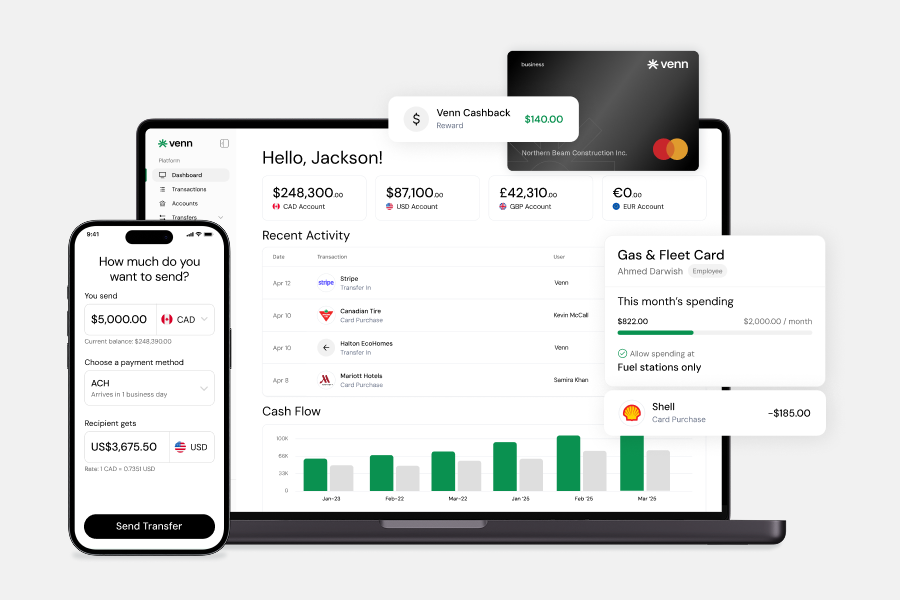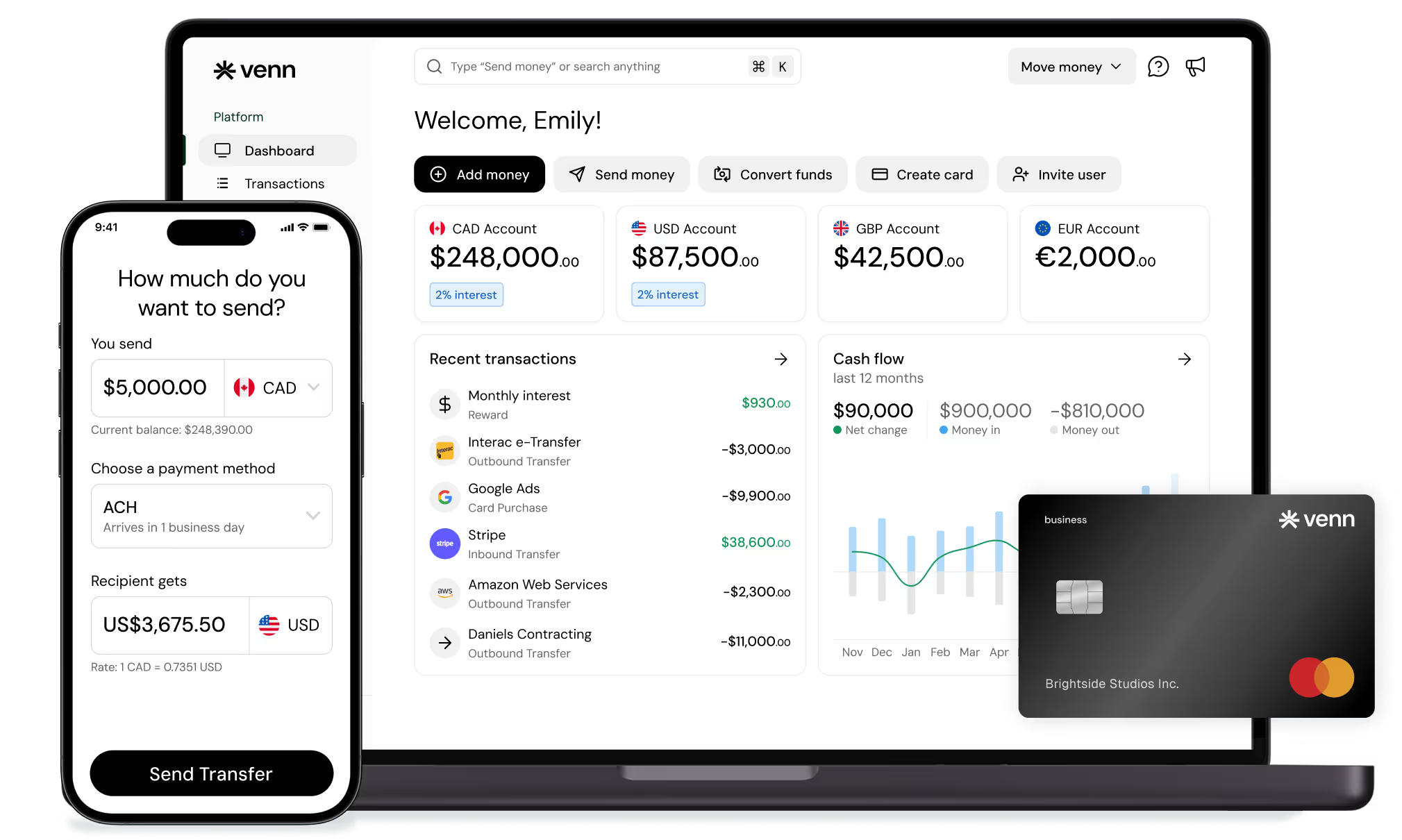Travel expense report: What it is and what to include for Canadians
Learn how to create a compliant travel expense report: what it is and what to include for Canadians. Get expert tips, tax guidance, and answers to key FAQs.


Trusted by 5,000+ Canadian businesses
Business banking for Canada
Local CAD and USD accounts, corporate cards with cashback, the lowest FX rates in Canada, free local transfers, and more.
Managing travel expenses effectively can make the difference between a profitable business trip and a financial headache. For Canadian businesses, creating proper travel expense reports isn't just about tracking spending, it's about maximizing tax deductions, maintaining CRA compliance, and establishing financial control that supports growth.
A travel expense report serves as the official record of all costs incurred during business travel, from the moment you leave your office until you return. These reports document everything from flights and hotels to meals and ground transportation, creating a clear paper trail that satisfies both internal accounting needs and external regulatory requirements. For Canadian businesses operating across provinces or internationally, understanding how to create and manage these reports properly becomes even more critical.
What Is a Travel Expense Report?
At its core, a travel expense report is a comprehensive document that captures all business-related costs incurred during work travel. Think of it as a financial story of your business trip, complete with dates, locations, purposes, and supporting documentation. In the Canadian context, these reports serve multiple essential functions beyond simple record-keeping.
The Canada Revenue Agency requires detailed documentation for any business expenses you plan to claim as deductions. Your travel expense report becomes the foundation for these claims, providing the evidence needed to justify your deductions during tax season or in case of an audit. Without proper reports, you risk losing valuable tax benefits or facing penalties for inadequate documentation.
Beyond compliance, these reports help businesses understand their true cost of operations. When you know exactly how much each business trip costs, you can make informed decisions about travel policies, budget allocations, and whether certain meetings might be better handled virtually. This financial visibility becomes particularly valuable as your business scales and travel expenses grow.
Why Travel Expense Reports Matter for Canadian Businesses
The importance of proper expense reporting extends far beyond simple bookkeeping. Canadian businesses face unique challenges and opportunities when it comes to travel expense management, making systematic reporting essential for success.
CRA Compliance and Tax Deductions
The Canada Revenue Agency maintains strict requirements for business expense deductions. Every dollar you claim must be supported by adequate documentation showing the expense was reasonable and incurred for business purposes. Travel expense reports provide this crucial documentation, connecting each expense to specific business activities and outcomes.
Form T2200, Declaration of Conditions of Employment, plays a central role for businesses with employees who travel. This form establishes that employees were required to pay their own expenses as part of their employment duties, enabling them to claim deductions. Without proper expense reports backing up these claims, both employers and employees risk having deductions denied.
The stakes are significant. A CRA audit triggered by inadequate expense documentation can result in reassessments, penalties, and interest charges going back several years. Proper travel expense reports act as your insurance policy against these risks, demonstrating that your business takes compliance seriously and maintains professional financial practices.
Financial Control and Budget Management
Every business trip represents an investment in growth, whether you're meeting clients, attending conferences, or exploring new markets. Travel expense reports transform these investments from abstract costs into concrete data you can analyze and optimize.
By tracking patterns across multiple trips, you can identify opportunities for cost savings. Perhaps certain hotels consistently offer better rates, or booking flights on specific days reduces costs significantly. Maybe you discover that driving to nearby cities costs less than flying when you factor in airport transfers and time. These insights only emerge when you maintain detailed, consistent expense reports.
Budget management becomes more precise when you have historical data from past trips. Instead of guessing what a sales trip to Vancouver might cost, you can reference previous reports and create accurate projections. This precision helps prevent budget overruns and ensures you allocate resources effectively across all business activities.
Streamlining Reimbursement Processes
Nothing frustrates employees more than waiting weeks for expense reimbursements or having legitimate expenses rejected due to missing documentation. Well-structured travel expense reports accelerate the entire reimbursement process, creating clear expectations and reducing administrative friction.
When employees know exactly what information to collect and how to present it, finance teams can process reimbursements quickly and accurately. This efficiency improves cash flow for employees who front expenses and reduces the administrative burden on accounting departments. The result is a smoother operation that lets everyone focus on their core responsibilities rather than chasing receipts or clarifying expenses.
Essential Components of a Canadian Travel Expense Report
Creating effective travel expense reports requires understanding what information to capture and how to organize it for maximum clarity and compliance. Canadian businesses must balance CRA requirements with practical considerations to create reports that serve both regulatory and operational needs.
Required Information and Documentation
The foundation of any travel expense report starts with basic trip information: traveler name, dates of travel, destinations, and the business purpose. This context helps reviewers understand why expenses were incurred and whether they align with company policies and CRA guidelines.
Each individual expense requires its own detailed entry, including the date, vendor name, amount, expense category, and business justification. Original receipts remain the gold standard for documentation, though CRA does accept credit card statements for expenses under $75 in certain circumstances. Digital copies of receipts are acceptable, provided they're legible and contain all necessary information.
The business purpose deserves special attention. Generic descriptions like "client meeting" provide minimal value. Instead, specify "Meeting with ABC Corp to discuss Q4 software implementation project" to create clear connections between expenses and business outcomes. This level of detail proves invaluable during audits or when analyzing the return on travel investments.
Eligible vs. Non-Eligible Expenses
Understanding what expenses qualify for deduction under Canadian tax law prevents costly mistakes and rejected claims. Transportation costs, including flights, trains, taxis, and business use of personal vehicles, generally qualify when incurred for business purposes. The CRA publishes standard mileage rates annually, currently set at 68 cents per kilometer for the first 5,000 kilometers in most provinces.
Accommodation expenses are deductible when traveling away from your tax home for business. This includes hotel rooms, but not upgrades to luxury suites unless justified by specific business needs. Meal expenses face the famous 50% limitation, meaning you can only deduct half of what you spend on food and beverages. This rule applies whether you're dining alone or entertaining clients, though the business purpose must still be documented.
Personal expenses mixed with business travel create complications. That sightseeing tour or spa treatment doesn't qualify, even if squeezed between business meetings. Extended stays for personal reasons require careful allocation of expenses between business and personal portions. When in doubt, err on the side of conservative claims to avoid CRA challenges.
Foreign Currency Considerations
Canadian businesses operating internationally face the additional complexity of foreign currency transactions. The CRA requires you to convert foreign expenses to Canadian dollars using the exchange rate in effect when the expense was incurred. While you can use the Bank of Canada's average monthly rates for simplification, maintaining documentation of actual exchange rates provides more accurate reporting.
Credit card statements often show both foreign and Canadian dollar amounts, simplifying this process. However, watch for hidden conversion fees that may be embedded in the exchange rate. These fees are deductible business expenses when incurred for business purchases, so track them separately in your expense reports.
Digital Tools and Automation for Expense Reporting
Modern technology has transformed travel expense reporting from a paper-heavy burden into a streamlined digital process. Canadian businesses that embrace these tools find they can maintain better compliance while actually reducing the time spent on expense management.
Automated expense tracking begins the moment you swipe a corporate card. Transactions flow directly into expense management systems, eliminating manual data entry and reducing errors. OCR technology can extract information from photographed receipts, automatically categorizing expenses and flagging potential policy violations. This real-time visibility helps businesses catch issues early, before they become compliance problems.
Integration with accounting systems takes efficiency even further. Instead of manually transferring expense data between systems, automated workflows can route approved expenses directly to your general ledger. This integration ensures consistency across financial records while freeing accounting teams to focus on analysis rather than data entry. For businesses managing multiple currencies, automated conversion at current exchange rates eliminates another manual step.
The benefits extend beyond pure efficiency. Digital expense management creates an audit trail that satisfies CRA requirements while making it easy to generate reports for tax filing or financial analysis. When every expense is captured digitally with supporting documentation, you're always ready for an audit without scrambling to locate paper receipts from months ago.
Best Practices for Canadian Businesses
Success with travel expense reporting comes from establishing clear policies and consistent processes before the first trip begins. Start by creating a comprehensive expense policy template that outlines allowable expenses, spending limits, and approval requirements. Make this policy easily accessible and ensure all travelers understand their responsibilities.
Pre-trip approval processes prevent confusion and ensure travel aligns with business objectives. Requiring approval for trips over certain dollar amounts or durations helps control costs while confirming the business purpose upfront. This approval documentation becomes part of your expense report, strengthening your compliance position.
Regular audits of expense reports, even on a sample basis, reinforce the importance of proper documentation and help identify areas for improvement. These reviews might reveal training needs, policy gaps, or opportunities to negotiate better rates with frequently used vendors. The goal isn't to create a culture of mistrust but to maintain professional standards that protect both the business and its travelers.
Canadian businesses that master travel expense reporting find it becomes a competitive advantage rather than an administrative burden. With proper systems and processes in place, you can confidently pursue growth opportunities across Canada and beyond, knowing your financial controls support rather than hinder your ambitions. The investment in getting expense reporting right pays dividends through recovered taxes, controlled costs, and streamlined operations that let you focus on what matters most: growing your business.
Frequently Asked Questions
Q: What is a travel expense report?
A travel expense report is a mandatory internal business document that captures all business-related costs incurred during work travel, including flights, hotels, meals, and ground transportation. Its primary function is to serve as the auditable record for the Canada Revenue Agency (CRA), requiring supporting receipts and a clear business justification that explicitly links each expense to a business outcome or income-earning activity.
Q: What types of expenses can I include on a travel expense report?
You can include all expenses that are reasonable and necessary for earning business income while away from your usual work location. This includes transportation costs (flights, taxis, car rentals), accommodation (100% deductible), and vehicle expenses (using either the actual cost or the per-kilometer rate). Importantly, meals and entertainment are only 50% deductible and typically require you to be away from home for at least 12 consecutive hours to qualify.
Q: How do I handle foreign expenses for CRA reporting?
All foreign expenses must be converted to Canadian dollars (CAD) for tax reporting purposes. The CRA requires you to use the Bank of Canada exchange rate that was in effect on the day you incurred the expense (the transaction date). Alternatively, you may use the Bank of Canada's average annual exchange rate for the taxation year, but this method must be applied consistently to all similar income or expense items. You must keep documentation of both the foreign currency amount and the conversion rate used.
Q: What documentation does the CRA require for travel expenses?
The CRA demands meticulous record-keeping to substantiate a deduction. You must retain the original receipt (or a clear digital copy) for every expense. This receipt must clearly show the date, the vendor's name, the amount, the nature of the expense, and the sales tax paid. In addition to the receipt, you must provide a specific business justification that validates the expense's connection to your business activities. For personal vehicle use, you must keep a detailed logbook to justify the 72 cents per kilometer (for the first 5,000 km in 2025) claimed.
Disclaimer: This publication is provided for general information purposes and does not constitute legal, tax or other professional advice from Venn Software Inc or its subsidiaries and its affiliates, and it is not intended as a substitute for obtaining advice from a financial advisor or any other professional. We make no representations, warranties or guarantees, whether expressed or implied, that the content in the publication is accurate, complete or up to date.
Venn is all-in-one business banking built for Canada
From free local CAD/USD accounts and team cards to the cheapest FX and global payments—Venn gives Canadian businesses everything they need to move money smarter. Join 5,000+ businesses today.

Frequently asked questions
Everything you need to know about the product and billing.
Venn is the cheapest and easiest way to manage your business banking needs. We offer the best currency exchange rates in Canada, chequing accounts in multiple currencies, domestic and international bank transfers, and a corporate Mastercard to manage all your spend. By signing up to Venn you automatically get:
- Accounts in Canadian dollars, US dollars, British pounds, and Euros
- The cheapest FX rates in Canada with free domestic transfers (EFT, ACH, SEPA, FPS)
- A Mastercard Corporate card that gets you the same great FX rates and cashback with no minimum spend requirements
Yes, Venn holds eligible deposits at our Partner Institution in our trust accounts, including deposits in foreign currencies. CDIC protects eligible deposits up to CA$100,000 per deposit category per CDIC member institution.
No, we don’t have any hidden fees! All charges, including currency conversion and premium plans, are clear and transparent. You can even issue unlimited corporate cards to your team and sign up with a free plan in minutes! Learn more about our transparent Pricing.
Nope! Other companies and traditional bank accounts have high minimum balance requirements. This makes accounts inaccessible for small businesses or individuals. Venn does not require a minimum balance. Your CAD and USD funds will also earn 2% interest regardless of the balance.
Our process is quick — Customers typically get set up in 5 minutes or less! Create a free account and start saving with no monthly fees, cashback on card spend, and the best FX rates around.
Of course! Our friendly Support specialists are available via Chat or Email 24 hours a day, 7 days a week, 365 days a year. All tickets are monitored and responded to within 24 hours, with an average response time of 30 minutes.
Yes, we have a direct integration with QBO and Xero. We are working on more integrations very soon!
Join 5,000+ businesses banking with Venn today
Streamline your business banking and save on your spend and transfers today
No personal credit check or guarantee.


